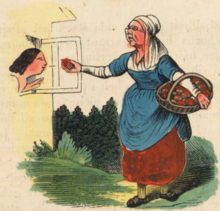Wikipedia:Fruit of the poisonous tree
This is an essay. It contains the advice or opinions of one or more Wikipedia contributors. This page is not an encyclopedia article, nor is it one of Wikipedia's policies or guidelines, as it has not been thoroughly vetted by the community. Some essays represent widespread norms; others only represent minority viewpoints. |
| This page in a nutshell: If an otherwise reliable source attributes information to an unreliable source then that information is likewise unreliable. Similarly, if there is a failure to abide by a Wikipedia process, the result will have reduced legitimacy or be void. |

Fruit of the poisonous tree is a legal metaphor in the United States used to describe evidence that is obtained illegally. The logic of the terminology is that if the source (the "tree") of the evidence or evidence itself is tainted, then anything gained (the "fruit") from it is tainted as well.
The metaphor can be applied to
It can also be applied to Wikipedia processes. If there is a failure to abide by required rules or norms during a discussion or other process, the result of that process will have reduced legitimacy, or if the failure was severe enough, be void.
Sourcing
Policies
- reliable source."
- WP:No original research: "Wikipedia articles must not contain original research. The phrase "original research" (OR) is used on Wikipedia to refer to material—such as facts, allegations, and ideas—for which no reliable, published sources exist."
- WP:RUMOR: "Wikipedia is not a collection of product announcements and rumors."
Anyone on Wikipedia must be able to check that the information comes from a reliable source. If the information found on a reliable source traces back to, is attributed to, or re-printed blindly from an unreliable source, without passing through the reliable source's fact-checking and editorial processes, then the information may be of questionable accuracy. Furthermore, any speculation or rumor from reliable sources may be inappropriate for Wikipedia. Sources that
How to check for fruit of the poisonous tree
Most sources attribute their information to someone or something, either at the end of the article or in the body of the article. Watch for keywords or phrases like "reported", "according to" and "via". Consider avoiding sources that trace back to unreliable sources. If you are not sure if the source is reliable then please read
Wikipedia processes
Process is important on Wikipedia. Sometimes, process is ignored for good reason, but other times, it is neglected out of ignorance or convenience, or deliberately avoided in an attempt to win a dispute. Canvassing is a common example of the latter, but there are many others.
When this happens, it undercuts the legitimacy of the results of the discussion, since a lingering question is raised of whether the result might have been different if process had been properly followed. For contentious discussions, even when the result is unchanged, the mere specter of the possibility is often enough to create problems, since the losing side can latch onto it.
It is up to community to decide what to do when a failure in process is discovered after the fact. Sometimes, if the failure was minor enough or the result was clear enough, the result can stand without issue. However, in other cases, it may need to be discarded and the process restarted. This option should be seriously considered in instances in which there is a reasonable possibility that the process was deliberately avoided, since it is important not to provide a perverse incentive to break rules (the assume good faith guideline does not require that we pretend bad faith does not exist).
